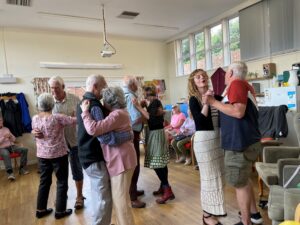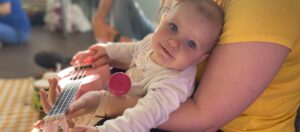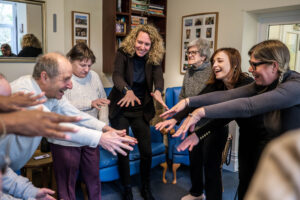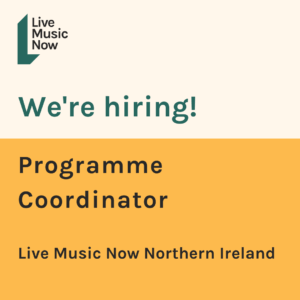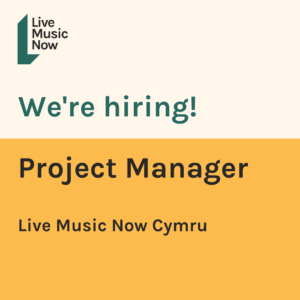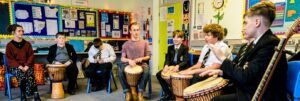.jpg)
Our intrepid volunteer Rebecca Williams caught up with harmonica, melodean player and three-time BBC Radio 2 Folk Musician of the Year nominee Will Pound and award-winning fiddle player Henry Webster at a recent LMN performance in the foyer of University College Hospital, London.
Rebecca: So how has it been working together as a duo for Live Music now?
Will: We’ve only been performing together with LMN since February, so it hasn’t been long. We have done a few special schools which have been good and have gone really well. With special school gigs you can’t really rehearse, well you can to an extent but you have to be so on your toes because it could change at any moment. It's quite tricky because you might have a child respond in such a way that requires you shift to some quieter and sometimes louder stuff. And the attention spans of the kids can be interesting. But its been good so far. We’ve got gigs and a couple of tours with LMN lined up.
Rebecca: What are some of the highlights of your time on the scheme?
Will: I did a gig for LMN in quite a rough area in Wales and this school in the bottom of the education league tables. I was a little scared at first because I was thinking some of these kids are 16 and have never seen a concert or heard live music. But interestingly the gig was amazing. At first they laughed because they didn't know how to respond, but eventually they kind of got it. At the end they were saying that they wished they had a musical device that they could listen to more of this music. Later on that day I went to a private school (nothing to do with LMN) and none of them listened, but at the other school the kids appreciated the music far, far more.
Henry: The first project I did was in a primary school where all of the children were severely disabled. I was inducted into LMN by more experienced musicians, Carla Sousa and Maz O'Connor. It's amazing how much these kids appreciate what you’re doing. I didn’t really notice at first; because some of these kids can barely move.
Will: It’s only afterwards that you appreciate it because their teacher will likely spot something that you don’t. They may be responding in a way that you wouldn't notice.
Henry: I was working with a kid called Charlie and he was blinking at me showing that he was really appreciating what I was doing. It’s so subtle and really shows the different ways of communication.
Rebecca: Do you feel like the training equipped you well the sessions?
Henry: The training gives you extra insight into things that you might not be aware of whether that is someone appearing not to be getting involved when actually they are totally involved.
Will: Some things you can't really train or prepare for until you experience it. I did a dementia project for a 12 week residency; we had a woman pass away during that time it. That was a bit hard to take because as musicians if you’re doing a residency you get connected to people as you see them every week. It was interesting seeing how the residents reacted to this. They weren’t as into the music but eventually they came around. I have also been in a situation working with children with special needs where a chair is being thrown across the room. Some things you can't really train for – you just have to get on with it and carry on.
Rebecca: So there seems to be an element of freedom and flexibility with folk music. Do you feel that this has worked to your advantage?
Henry: Yes. LMN work and folk music suit each other very nicely because what we do is take a melody and just for go with it from there. We have a very simple musical source which we are infinitely flexing. It’s very accessible music for kids.
Rebecca: How has being a LMN musician influenced you as an artist?
Will: That’s interesting. I think now I’m more confident. It’s a lot more nerve racking doing a LMN special school gig than playing at the Barbican for example, because you don’t know what is going to happen. I think it’s good though because your stage presence elsewhere gets better as you get use to getting to working so hard on stage.
Henry: I think a normal stage is a very sterile environment so from doing these (LMN) gigs you’re trying to create something a little more volatile when you’re on stage.
Will: You can take more risks than you could potentially on a normal stage. In an LMN gig you can walk around and show people your instrument.
Henry: I think it's enabled us to do things like that. We did a band gig the other day and we were playing in a support slot to 20/30 kids and they sat in the front row of the audience. At the end we made them do a dancing competition so we played a really dancy tune and they were jumping up and down at the front. Then we went into the audience with them, it’s the kind of thing that we wouldn’t necessarily have done if not for LMN.
Rebecca: If you had to do things over again would you still choose this as a career?
Henry: I don’t know… I’d do this for fun and become a banker [laughs]. No, I don’t think I could do anything else. Our music work is so varied, which prevents us becoming bored.
Will: I wouldn’t be able to do anything else. It can be tough at times and it all comes down to money which is horrible.
Henry: When I arrived at Trinity I wanted to explore the folk thing more deeply- that’s where I started sliding away from what was my standard music path. It has opened me up to loads of different types of music instead of getting stuck in a classical narrow-minded path. The options for me were never music or not music, they were classical or folk. There was really never any option of anything else.
.jpg)
Will Pound, Henry Webster and LMN Volunteer Rebecca Williams
